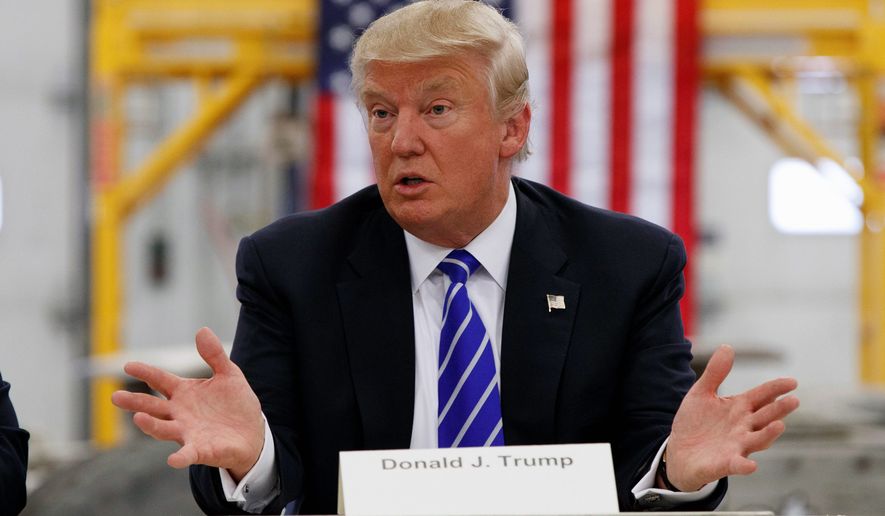While calling him a flawed messenger, evangelical leaders have rallied behind Donald Trump, saying he has struck a chord with his vow to repeal a decades-old prohibition on tax-exempt organizations such as churches being able to endorse political candidates.
Mr. Trump’s push to repeal the 1950s-era provision named after Sen. Lyndon B. Johnson has proved to be a powerful lure. The Republican presidential nominee allowed it to be part of the party’s platform, mentioned it in his nomination acceptance speech last month and took the case directly to Christian leaders last week in Orlando, Florida.
“If I get elected president, one of the early things, one of the absolute first things I’m going to do is work on totally knocking out the Johnson Amendment,” Mr. Trump told the leaders.
Part of the lure for conservative religious leaders is the belief that Democrat-leaning churches, particularly in minority communities, are crossing the line.
In a recent survey by the Pew Research Center, 14 percent of recent churchgoers said they had heard their clergy speak directly in support of or against a presidential candidate.
About three in 10 black Protestant churchgoers reported pro-Hillary Clinton messages, and two in 10 black Protestants reported anti-Trump messages.
Bishop E.W. Jackson, from Chesapeake, Virginia, said a double standard means those on the left don’t fear reprisal.
“Are we kidding ourselves? Is the IRS going to go after a black church for having endorsed President Obama?” Mr. Jackson said.
He said he would not endorse a candidate in his church but added that the mere fact that Mr. Trump is making an overture on the issue suggests the real estate mogul would defend religious freedom.
“There needs to be a new climate set for First Amendment rights and the exercise of those rights and that Donald Trump is setting, in our view, the right climate, so it’s very encouraging,” said Mr. Jackson, the 2013 Republican nominee for lieutenant governor in Virginia.
The Trump outreach is paying dividends.
Mr. Jackson supported Sen. Ted Cruz during the Republican primary race. So did Family Research Council President Tony Perkins, who ended up delivering a stirring endorsement of Mr. Trump at the Republican National Convention last month.
Mr. Trump will speak at the Values Voter Summit next month in Washington, an annual event hosted by the Family Research Council’s legislative arm.
“The fact that he is the first Republican nominee to attend since the summit’s inception in 2006 demonstrates his understanding of the importance of values voters in the general election and his desire to work with them in addressing the critical issues facing our nation,” Mr. Perkins said.
Mr. Trump frequently touts his support from evangelicals but jokes that he might not be the ideal model of piety. In his RNC speech, he said he is not sure he totally deserves the support he has received from the community.
Ken Blackwell, a senior fellow at the Family Research Council and a former secretary of state of Ohio, said Mr. Trump is taking the right approach.
“He doesn’t try to come off as an evangelical himself, but as he did in Orlando. He speaks to the public policy issues, whether you’re talking about pro-life issues, religious liberty issues, the Supreme Court or the Johnson Amendment, that are very important to evangelicals,” Mr. Blackwell said.
A Florida pastor and board member of the National Hispanic Christian Leadership Conference said recently that evangelicals shouldn’t necessarily just vote for the “least bad” of two unpalatable options in Mr. Trump and Democratic nominee Hillary Clinton.
Pastor Eddie Rodriguez said Mr. Trump has a lack of compassion for immigrants, Muslims and minorities, while Mrs. Clinton’s position on abortion would be a non-starter for many Hispanic evangelicals.
“Neither Hillary Clinton nor Donald Trump have substantively articulated the road to legitimacy for millions of illegals with American-born children who live productive lives, which is a huge human issue in our reality,” Mr. Rodriguez said.
Many conservatives and religious leaders have argued that millions of conservatives stayed home in 2012 because they weren’t enthusiastic about Republican presidential nominee Mitt Romney, who is Mormon and has violated conservative orthodoxy in the past on issues such as abortion.
“You didn’t vote for Romney. Evangelicals, religion didn’t get out and vote, and I don’t know why, whatever the reason, I’m not sure why. A lot of different reasons for it,” Mr. Trump said at the gathering last week in Orlando.
Mr. Blackwell said Mr. Trump has to do “much better” than Mr. Romney among evangelicals and has not reached that point.
“He can’t leave as many on the sidelines, as Romney did,” he said. “I think right now he is probably on par with Mitt Romney. That’s not good enough.”
• David Sherfinski can be reached at dsherfinski@washingtontimes.com.




Please read our comment policy before commenting.